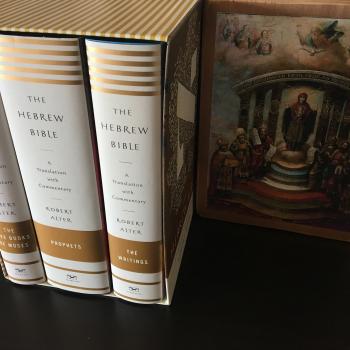![Anglican Compass Rose - Public Domain, with modifications by Gregor Shapiro (2000px-Compassrose_Flag.svg) [Public Domain], via Wikimedia Commons](https://wp-media.patheos.com/blogs/sites/721/2014/08/2000px-Compassrose_Flag.svg_-1024x683.png)
In the previous post, I ended with a suggestion that Vicky Beeching’s gift to the church catholic by coming out brings enormous clarity to what is going on in the Anglican Communion, especially around the realignment that happened in the late 1990s and 2000s. For those who need a quick definition of what the realignment is, it’s a euphemism that refers to how Anglican and Episcopal parishes in the United States and Canada pulled out of their home dioceses because of North American Anglican moves to bless same-sex unions, ordain gay clergy, and elect gay bishops. Because they took cover in Anglican provinces mostly in Africa (though some in Asia, Australia, and the Southern Cone also took part), the narrative that took shape suggested that those who were historically the ones being evangelized were now re-evangelizing the evangelizers. This narrative usually flies under the header of Global South Anglicanism. For an academic version of this story, see Phil Jenkins’s The Next Christendom. For a popular version, Thad Barnum’s Never Silent is a fairly engaging account. For those who need all of the sordid details, please read my account of ‘Anne Hathaway Anglicanism.’
The reason I forbid readers to read this post before reading the previous post is because over in the other post, I’ve made all the necessary connections for why Beeching is an Anglican to whom we should pay attention — she’s an evangelical Anglican, her worship music has evangelical Anglican sources, she lived in Nashville and San Diego making contemporary Christian music so that her American evangelical connections are impeccable, and one of the privileged few to whom she had come out privately is the present Archbishop of Canterbury, Justin Welby. Unwilling to rehearse of that here, I simply forbid you to read this post until you’ve done your due diligence with the previous post.
Vicky Beeching is an Anglican. This is very significant. That’s because of the person to whom Beeching would most likely be compared: Jennifer Knapp.
Like Vicky Beeching, Jennifer Knapp is also a popular contemporary Christian music personality who very publicly came out as a lesbian. Just as Vicky Beeching was confronted by outspoken anti-gay pastor-activist Scott Lively on live television when she came out, Knapp was also confronted by Pastor Bob Botsford on Larry King Live. Like Lively, Botsford told Knapp that his heart broke for her because she was living a lie that contradicted Scripture. Knapp’s response was that Botsford was not her pastor. If Botsford had been her pastor, Knapp reasoned, then it would have been fair to exercise pastoral jurisdiction over her as a church member. But she wasn’t. She was part of another congregation with other pastors who affirmed her, and her bottom line was that Botsford’s attempt to exercise pastoral authority over her was illegitimate because it violated the boundaries between his congregation and hers.
It would be tempting to compare Beeching to Knapp because almost the exact same thing happened to Beeching on live television. As I said, Beeching was called out almost exactly like Knapp because the more conservative evangelical man standing in for the Christian Right accused Beeching (like Knapp) of living a lie contrary to Scripture.
It’s what follows next that makes everything about Beeching different from Knapp. That’s because Beeching is an Anglican.
Beeching can’t make the congregational autonomy argument that Knapp makes. This is because, as I said, Beeching is an Anglican. Anglicans don’t believe in congregational autonomy; our polities are parishes in dioceses under the jurisdiction of bishops that are in communion with each other and who all trace their succession through Canterbury to the apostles. Beeching can’t say to Lively like Knapp says to Botsford, ‘You are not my pastor,’ because congregational autonomy is not going to cut it for Beeching. Lively is thus not in a different ecclesial category for Beeching (as Botsford is for Knapp); he is in the same ecclesial category. He is a pastor, so Beeching merely says to him that it’s people like him who have caused her psychological damage. Observe well, then, the effects of this disagreement. The contention rests on Lively’s repetition that Beeching’s lifestyle is not ‘biblical,’ for Beeching argues that that there are multiple ways of reading Scripture and that the passages that he cites to condemn her sexual orientation have contested meanings.
Yet Beeching does not disown Lively the way that Knapp disowns Botsford. She knows that they’re stuck together in communion, terrible as that may sound, because as much as she may wish that she were ecclesially autonomous from him, the truth of the Anglican charism means that they cannot be sundered at an ontological level. Indeed, this raises the emotional stakes for her contention against Lively: if people like Lively have inflicted psychological damage on her and those whose sexual orientations are non-heteronormative and if they are ontologically stuck together, then it is an imperative for Beeching to demand that Lively stop oppressing her and hear her out on the multiplicity of hermeneutics, a demand that is in fact not unreasonable considering St. Augustine’s De Doctrina Christiana, where Augustine allows in the preface for all sorts of biblical interpretations if they are governed by the rule of faith, which is charity.
In short, as an Anglican, Beeching understands what Knapp does not: there is no such thing as total ecclesial autonomy, and the more that one understands that, the more one works to make ecclesial co-existence at least bearable.
Dig deeper, though, and one finds that this ecclesial ontology has implications that drag that construct called ‘Global South Anglicanism’ into the fray. That’s because, as the BBC program itself mentions, Lively is close to the leaders of a nation-state called Uganda. Deny as he may that he had a hand in the draconinan Anti-Homosexuality Bill that threatened to execute queer persons in Uganda, Beeching herself recently shared a link that an American federal judge has ordered Lively to stand trial for crimes against humanity.
This is significant because Lively’s actions in the mid-2000s in Uganda disturbs the larger narrative of the Anglican realignment. Provinces such as Rwanda, Nigeria, Kenya, the Southern Cone, and yes, Uganda, took in some of these ‘realigned’ Anglican churches. As I related in my definition of the Anglican realignment (see above, scroll past the Gandalf GIF), this was the story of how the Global South Anglicans, especially from Africa, were re-evangelizing North America, especially from its capitulation to what might be chalked up to (in Southern Baptist terms) a ‘gay agenda.’ In other words, Anglicans in African nation-states were going to save Anglicans in the West.
The problem is that Lively’s actions suggest that this Global South Anglican narrative may not be as ‘Global South’ as meets the eye. If Lively was moving around Uganda around the same time that the Anglican realignment was going on, how many other Americans were invested in making the realignment happen?
Let’s dig further.
In the lead-up to the Scott Lively confrontation, Beeching recounts that one of the more harrowing experiences in her journey as a gay person was when she had an exorcism performed on her at a British evangelical camp. This also messes up the Global South Anglican narrative. After all, one of the more celebrated stories of the 1998 Lambeth Conference was of an African archbishop attempting an exorcism on a gay rights activist. Certainly, analyses at the time noted that African and Asian primates, bishops, priests, and deacons had mostly attended the same seminaries as their Global North counterparts. Yet according to the narrative of Global South Anglicanism, this phenomenon could also very well be explained via the African archbishop’s Global South conditions, where spirits are real and demons prowl and exorcisms happen regularly because priests have the same status as witchdoctors. Certainly, that’s how Phil Jenkins explains why Southeast Asian primate, Archbishop Moses Tay, attempted to exorcise the City of Vancouver because of the totem poles in its urban park, Stanley Park (The Next Christendom, p. 130).
The question is, how does that exoticized Global South Anglican narrative explain Beeching’s story of British evangelicals trying to exorcise her? Might the explanation that those Global South Anglicans attended the same schools in the Global North and were in collaboration with conservative Anglican, evangelical, and charismatic groups in the Global North hold more water, in light of Beeching’s experience?
Let’s keep digging.
The impression that one gets about the Anglican realignment is that the parishes that broke away were mostly evangelical Anglican. Though this group certainly included charismatic and Anglo-Catholic Anglicans, that the Global Anglican Future Conference (GAFCON) was heavily dominated by Sydney Anglicans (who apparently have to debate over whether their archbishop is ‘Reformed’ enough to hold office), as well as African and Asian Anglicans who emphasized the Bebbington Quadrilateral of evangelical distinctives (biblicism, conversionism, activism, and crucicentrism), who held an after-gathering at All Souls’ Church in London seems to confirm this image. Certainly also, some of the charismatics would technically fit into an ‘evangelical Anglican’ stream — ‘evangelical’ here defined in Anglican terms as those in the English church who understand authority as primarily derived from Scripture, not, say, apostolic succession (like the Anglo-Catholics) or scientific progress (like the latitudinarians).
Well, like it or not, Vicky Beeching is an evangelical Anglican. Despite the image of those who push what Beeching calls ‘LGBT theology‘ tends to be from the more liberal wings of Anglicanism — James Pike, Jack Spong, Gene Robinson, Mary Glasspool, Marc Andrus, Patrick Cheng — how much of a shock to the system is it that Beeching continues to identify as an evangelical Anglican who takes the Bible so seriously that her post defending her theological views is based on the Bible?
What’s the point?
The point, then, is that Vicky Beeching embodies what the previous Archbishop of Canterbury, Rowan Williams, calls ‘the body’s grace.’ For Williams, the fact of same-sex attraction and even unions are a gift to the church because they help Christians think about how love is expressed corporeally. Certainly, when his successor, Justin Cantuar, expresses that same-sex couples often put opposite-sex married couples to shame in their care for each other, Welby is also referencing Williams.
But Beeching takes that one step further. Beeching’s body’s grace is an open sign of contradiction to the Global South Anglican realignment narrative. She is an evangelical Anglican theologian: she cannot afford to endorse congregational autonomy. Her interlocutor is Scott Lively, a person whose physical presence in Uganda also flat out contradicts the Global South Anglican narrative because he casts suspicion on whether homophobic prejudices in fact originated in what might be derisively regarded as the ‘primitive’ cultures of the Global South. Beeching’s exorcism flat-out contradicts the understanding of the Global South as ‘primitive,’ for if exorcism is a sign of prmitiveness, then the Global North evangelicals who tried to exorcise her would also be primitive. Her evangelicalism — rooted in a theological orientation based on Scriptural authority — flat-out contradicts accusations of latitudinarian liberalism.
In short, Beeching reveals where the Anglican Communion fault lines actually lie. The truth, as Beeching reveals it, is that the Global North-Global South imagined geography is a smokescreen. If there is anything that Beeching’s body’s grace illustrates clearly, the realignment has never really ever been about Global South, postcolonial agency, and Anglicans of colour. Postcolonial Anglicans, as Kwok Pui-lan and Ian Douglas have called people like me, have never really been addressed here — we have merely been spoken for and over.
Beeching’s closeness to the Archbishop of Canterbury is thus the ultimate gift. After all, one of Justin Cantuar’s major tasks is to reconcile this fragmented Anglican Communion. With Beeching coming out, the mist has evaporated, and the real fault lines finally have become crystal clear. As an Anglican of colour observing Welby’s talent for deep listening, his knowledge of the actual on-the-ground political realities in Africa, and his almost overflowing glee at welcoming those who regularly disrupt his own evangelical Anglican narrative, I expect great things out of this Archbishop of Canterbury for the Anglican Communion. After all, precisely because of Vicky Beeching’s body’s grace, we might see an Anglican Communion finally ready to tackle the deep-seated corporeal issues of race that have plagued us since the dawn of modernity.












